
35 minute read
If you want to be healthy
If you want to be
healthy
Advertisement
Is it possible not to eat meat and stay physically active? Are the dietary supplements harmful or useful? How to stay fit? As they say, there are so many people, so many opinions. Let’s find out about some of them.
К“Eat me!” Kremlin diet, separate nutrition, interval fasting, physi‑ otherapy, yoga, fitness… So many ways to stay healthy, it’s easy to get confused. It would be good to turn a blind eye to it and live “somehow”, but the coronavirus is not dozing off: it is looking for a new victim with low immunity. And we do not want to get sick, and there are so many things to do…The question arises: how to keep up health in the conditions of global hypodynamia and epi‑ demics that replace each other? When at every corner of the city delicious fast food is on sale and on the shelves of pharmacies there are rows of beautiful jars of dietary supplements, in which the complex of vitamins and trace elements is the most balanced. The Internet does not give clear instructions for action. More precisely, it offers as many options on the topic “you want to be healthy”, as there are pages in search services, i. e . a lot. So I decided to turn to a the safe and proven method: to talk live with those who in my subjective opinion look like a “healthy person”, look good and inspire trust. And then to “average” for myself, to form a personal point of view on this subject.
Healthy lifestyle-consultant, Sergey Pustyulga: “Don’t run to extremes”
For 40 years he’s been committed to a healthy lifestyle. He doesn’t drink, he doesn’t smoke. He served in the Armed Forces for 17 years, trained guys at the Institute of National Security for 13 years: he taught general physi‑ cal training and hand-to-hand combat. Later, Sergey Pustyulga, having withdrawn from military business, “set on the feet” one of the leading Minsk clubs for a healthy lifestyle, worked there as a fitness director.
— S ergey Nikolayevich, what is fitness? The concept is borrowed from American culture…
— Th at’s right. I don’t like the word “fitness” very much, as I grew up on the Soviet traditions, where there were notions of “physical culture and sport”, “fitness and health-improvement ac‑ tivities”. What is the principal difference? The approach. In our country physical culture is seen as an element of harmonious personal development, in America and Western Europe it is the preparation of a person for work. It is important to be an active, healthy social element that will not “stand idle”. After the collapse of the USSR, our integral system of approach to physical culture collapsed as well. Each specialist, trainer began to bring something different, introduce new elements in physical training, based on a personal understanding of how it should be. This is how fitness began to penetrate into our culture. Now we are at a stage when two systems coexist: according to an old tradition, we have physi‑ cal training at kindergartens, school, university, army. And after it? To go to a sports group which trains for specific sports, just like it used to be before. And if I don’t want to do some particular sport? That’s where fitness comes to help: zumba, less mills, pilates… But its level is not yet European, let’s say. In Soviet times there was a public coach — a person who was interested in his work, knew a lot, was certified. And now, to be a fitness instructor, it’s enough to graduate from an economic, technical university. What can such a coach teach? Except to make money on a clientele. But first of all, there must be a question of health of the person you train. You have to understand that exercise is a cure. If you give an overdose — you can get a negative effect. Less — no effect. In Europe, a trainer is also a kinesiologist (he studies health status by the tone of differ‑ ent muscle groups — Auth.) In the American system you need to get many different certificates. And while you go through all the stages, invest financially, you will think through carefully whether you want to do it. This is a system that’s just starting to work for us. For example, to promote someone’s individual method, you need to be a member of the club of this author, which means to be trained by him or her and get a certificate, which must be verified every year. Therefore, before you go to the nearest to your home gym, I advise you to find out what education and what certificates your coach has.
—And what to begin with, if you want to move to a qualitatively different standard of living: to train properly, to eat?.. In general, to feel good.
— I n the club where I worked, we built such a system. I suggest you should take it for yourself. First, the client goes to the sports doctor or provides a certificate of medical examination. The doctor draws up an anamnesis, makes a computer screening diagnosis. It takes no more than 5–7 minutes and can determine body compo‑ sition, potential hazards: kidney problems, weight problems, etc. The doctor then writes out recommendations and tells you what to start with. It’s a gradual, long process. There’s no need to rush anywhere.
—Sergey Nikolayevich, what makes people think about their health? The answer could be age, when something hurts, does not allow to live a full life. But today young people are also actively interested in these questions. And you yourself have been doing sports since your youth.
—Yes, from a young age I was curious to know if I could im‑ prove my genetic abilities. I did so many sports! Wrestling, weight‑ lifting when I was 12 to 18 years old. Then I was called up for mi litary service, in the army there was no weightlifting, so I chose officer all-round: cross, gymnastics, grenade throwing, shooting, sambo. Why do people want to get up from the sofa and start tak‑ ing care of themselves? Because they want to get up from this sofa c heerful and without pain, especially in the morning and at any age.
—And how to cultivate in a child right habits?
— All habits are formed in the family. If parents do not do sports, do not eat properly, their children will follow the same life‑ style. Someone meets friends to drink beer, spends two hours on it, and someone decides to spend time together in the gym and to discuss pressing issues there. It’s called a culture of communica‑ tion. Let me mention my son as an example. I never forbade him anything, gave him the right to choose, but explained my position. He has also been practicing sports since child‑ hood and lives a healthy lifestyle. As they say in the army: by personal example…
— N ow there’s so much information about what’s bad, what’s good, how to eat… Vegetarianism, fruit-eating, cheese-eating, separate nutrition, blood type diets, Kremlin, interval nutrition… The list is huge. And what to eat or not to eat is not clear.
— In the Soviet Union there was such a no‑ tion: rational nutrition. It’s when we lay out the products correctly in positions of protein-fatcarbohydrate, observe caloric value. It seems to be nothing complicated, we eat correctly: I ate only one cookie a day, had only one cup of cof‑ fee, without sugar. And there’s still a lack of pro‑ teins, fats, carbohydrates and trace elements. Why is that? Probably because of the lack of assimilation of those elements by the body it‑ self. What do we do? To consult with specialists: gastroenterologist, endocrinologist, nutritionist with medical edu‑ cation. Because there are many diets and even more bio additives, but they can be dangerous for you. In general, bio additives are concentrated products. And if we overeat cottage cheese, which can’t be consumed more than 200g a day, what about “kilogram” doses of concentrated substances that are in cottage cheese? The most important thing is not to rush to extremes: “bad food — we will not eat it”. We have to proceed from what we have. Manu‑ facturers of products still observe the minimum standard of care. They say chicken consists of antibiotics. But you can boil them out! Yogurt is bad? You can make it yourself, fermentation starter is on sale. You don’t have to listen to everyone. Everyone today is trying to promote and sell their product, their theory. What to do and what to start with? With the minimum. For example, keep to water regime: drink more! If you don’t you understand what steps should follow each other, ask a specialist you trust.
— Do you eat meat?
— I do. I believe that any diet should only be used if there are any health problems. Any body is self-cleaning. It’s enough to
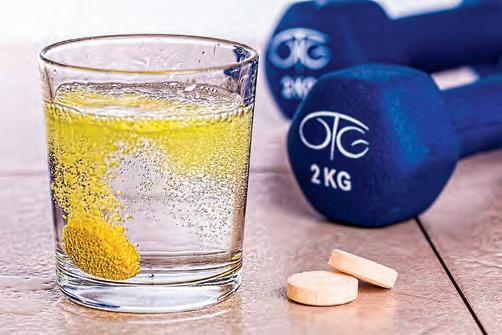
create minimum conditions for that. You don’t have to dive into ayurveda, switch to one-sided nutrition, penetrate into your body to the cellular level, if you’re not a doctor… I don’t want to talk badly about self-taught, there are some good ones. But I’ve seen only some good self-taught trainers. A lot of people are interest‑ ed in dietology, but none of them, as a rule, have read a textbook on dietology. It’s not about nutrition, it’s about diet. I think it’s wrong to say that vegetarianism is a normal diet. If a person has prob‑ lems with meat consumption, accumulates elements that are un‑ necessary to the body — yes. But the doctor will not tell a healthy person to stop eating meat. Because our entire structure is made up of protein.
—Speaking about a healthy lifestyle, we can’t but mention global issues that are beyond our control, such as ecology…
— Y eah, well, the environmental situation is pretty complicated, es‑ pecially with Chernobyl. And in general, civilization changes the way we live: I’m talking about hy‑ podynamia, or the so -called cam‑ eraman profile, when you sit at the computer solving is‑ sues without any distrac‑ tions. And good nutrition requires finances. Sausages are cheaper than a piece of meat, you’ll agree. You must have enough time to cook in the kitchen. Motor activity is in a sense a luxury now: you have to pay for a gym. Of all these parts, you need to somehow put together a puzzle called healthy lifestyle. By the way, I personally find helpful the gadgets that fix every movement and condition of my body.
— Wh at is your attitude to such a trendy phenomenon as body-positivity?
— A s to lobbying certain interests. If we talk about healthy lifestyle- there is advertising of sportswear and shoes of this or that brand. Fast food restaurants need to promote their products, so they reject “90–60–90”, for example. And a certain disorder in so‑ ciety is created. But it is important to understand that this is not a war of people, but of economic structures. Healthy lifestyle itself or body -positivity, as an attitude to oneself, is relegated to the back‑ ground. I think that society should regulate such processes and not go to extremes. There should be no opposition of one to the other.
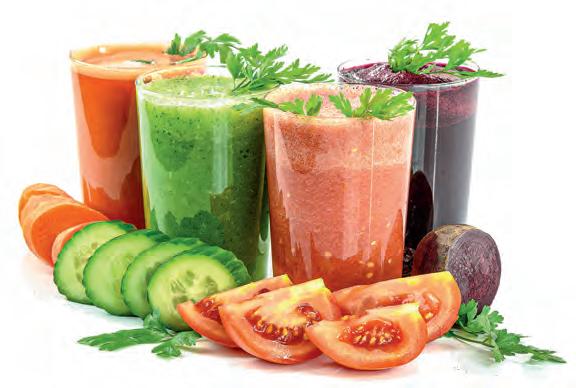
Photographer Anastasiya Vragova: “Healthy lifestyle is life philosophy”
Nastya became interested in veg‑ etarianism when she studied at the Minsk State Linguistic College. She got married, became famous as a wedding photographer, received numerous awards at various international contests. She and her husband Arthur, also a photographer, are in‑ vited to work in France, Italy, Greece and other Western European cities. Nastya has not changed her lifestyle. I asked her to tell me what influenced her choice at an early age. — A t the age of 16 I started to be interested in the topic of healthy lifestyle, to study literature. And the deeper I went into the topic, the less the relationship between meat and health became clear to me. Of course, many factors influence our good health: ecology, physical activity, psychology and so on. No healthy diet will correct the situation if a person lacks sleep or in a nervous strain. Nutrition is not a panacea, but an important condition to feel “in the resource”. I gave up meat because animal protein has a high acid load. Of course, the human body works to excrete decay products. But the cost of restoring acid -alkaline balance is demineraliza‑ tion of bones and cells. And everyone heard about antibiotics used to keep animals on farms. Through meat they get into our body, acidizing it. Consump‑ tion of animal products causes greater risk of cardiovascular disease, cancer, osteoporosis, diabetes. And I don’t even want to be indirectly involved in cru‑ elty against animals. The rejection of animal products is one of the best ways to reduce the negative im‑ pact on the environment. I want to quote a PR manager of one of Minsk vegan cafes Marta Skugareva: “If a person gives up meat for one day, he or she will save 3 thousand liters of water and 300 trees from felling. By giving up meat for just one day, you can do more for the environment than if you drive a hybrid car and do recy‑ cling”. The fact is that animal production increases greenhouse gas emissions due to the huge amount of methane produced by ani‑ mals (this is their digestive activity). As a result, the temperature on Earth is rising. Also, most of the water on the planet is used not for personal needs of people, but for the livestock industry. For example, for the production of 1 kg of beef 43000 liters of water is needed, while for the production of 1 kg of cereal — 1000 liters. But the initial motivation to change the diet for me was still the desire to stay healthy and active for many years. The other fac‑ tors I’ve listed work together. It is not just a choice of food system, it is a life philosophy.
How do you feel? Medicine is against such radical methods. — T oday, 10 years after giving up meat, I feel great! I have been regularly examined and tested for several years — everything is normal, sometimes I even get compliments from doctors. But it’s a long way to rebuild the body. In the beginning it is possible to feel even worse, as there will be active cleansing and, as a rule, chronic diseases aggravate. Therefore, in no case you should change the diet radically! The opinion of traditional medicine that meat con‑
tains amino acids essential to other foods or g has long been criticized. Traditional medi‑ g un cal discourse very rarely touches on the ali s a subject of intestinal microflora and its abil‑ ity to form the very “indispensable” amino acids, for example, B12. There are just a number of conditions: a person must be well cleansed, consume a lot of raw fiber to feed this very microflora, exclude dysbac‑ teriosis. But when people switch to plant foods, they often pay little attention to targeted cleansing of the body. And many people simply can’t eat raw vegetables in large quantities. Accordingly, microflora cannot produce the necessary amino ac‑ ids. It takes time to regroup, to recover. It takes years. And the shortage of amino acids is actually building up. These aren’t fairy tales, and anemia is a real possible problem (forgive me, my friends- vegans). These problems usually appear in a few years. And that’s why a person has to take supplements.
—What is the fundamental difference between vegans, vegetarians… What group do you and your husband belong to?
—He eats dairy products. He switched to vegetarianism after three years of living together. Although he grew up in the coun‑ tryside, his parents always raised pigs and chicken, and there was a lot of meat in the family. In mine, too. But now my parents have given up meat, too. I consider myself to be a vegetarian because I drink coffee with milk. But I don’t eat other dairy products or I can eat something a few times a year if I want. But I also eat honey, and vegans treat it as an animal product. All these categories of ve‑ gan, vegetarian, cheese eater… and so on are pretty conventional. For example, there are vegans who add raw yolks to their diet once every few months to make up for B12, but do not stop consider‑ ing themselves vegans. And for other people, it can already be a big deviation from “vegan philosophy”. You can’t separate them all into clear categories.
VladislavIvanovsky, psychotherapist of Minsk city psychoneurologic dispensary: “Think for yourself, decide for yourself”.
He gave an interview for our edition (№ 4–2020). Then in a two-hour conversa‑ tion we touched upon a lot of questions that could not be covered in one article. This is an abstract from the in‑ terview which deals with nutrition. — V ladislav Georgiyevich, everyone already knows that most of our products are refined, and therefore it is necessary to take additional vitamins. However, there are a lot of facts about how
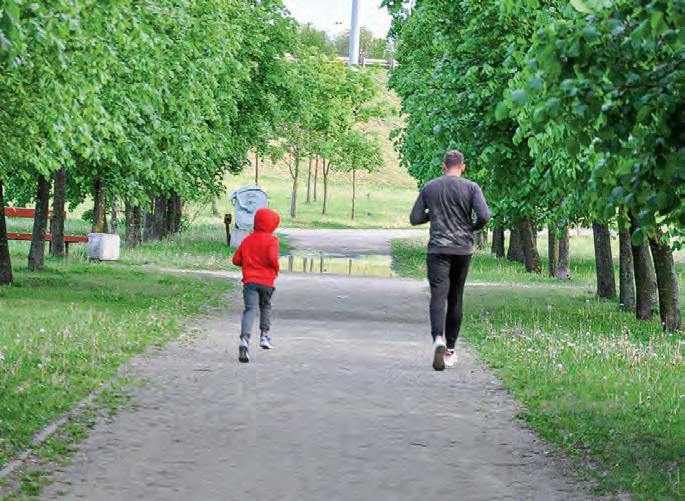
dangerous different dietary supplements can be. What can we do? Who to believe? — From time to time my friends send me videos about some scientific research conducted by a well-known TV com‑ pany, which prove that such dietary supplements should not b e taken. (I use them myself and in large quantities.) I try to find out: what exactly a tested person took. It turns out that we were talking about artificially synthesized vitamins in mixed dosages. That’s right! It’s dangerous to give synthetics in large doses. Vitamins are different, and that’s what we need to know. If you can’t, you have to turn to specialists. The truth is, if you want to turn public opinion in the right direction, the facts can be inaccurate. For example, when my relative studied to be a web-designer, she was given a task to make an animated film with seven additional meanings. If you made it with less than five — you failed a exam. That is, if students know how to do it, what to say about professionals on television! In general, in short, you should either learn to analyze information yourself, or find professionals in this matter and follow their recommen ‑ dations. As the song sings: think for yourself, decide for yourself w hether to have it or not… ***
Having talked to different people, I made a trite conclusion for myself: there are as many opinions, as there are people. The only thing that everybody agrees on is that a radical change in the way of life should be made gradually, carefully preparing for every next step. And the sooner, the better. It seems that modern youth understand this — to look good and be healthy is now in fashion.
And in general, as they say, all diseases come from nerves. So, I think we should start with a good mood. Even my son at the age of five once said: we will start having fun from morning. By Alisa Gungor
Stop t e moment
A picture I In general, I got acquainted with him many years ago: we acted together in a Sunday entertainment program on one of the Minsk channels. He, an experienced actor, was in the lead role; I, a stu‑ to dent of the theatre department, was in a supporting role. We stayed together for 5 minutes, but we “came to terms” in an instant. Hu‑ mor, charisma, youth and bottomless blue eyes of Denis, I guess, more than once influenced his acting success. As far as I know, he is remember always filmed somewhere. Sometimes in Russian series with film stars, sometimes in commercials, sometimes in some social project. Now Denis has a new “pursuit”: he is involved in the creation of a national series, a village comedy “Svoi”, in which plays the main role of a young composer. Only the second episode has been filmed, so Why do people spend money on personal what the film is about has been a secret so far. photo shoots and spend many hours in Besides, the famous Belarusian actor, who has worked in the front of a camera? Even the best picture cannot be viewed endlessly: one day it will still get into an album and onto a theater for 10 years and 17 years in the movies, has a hobby since his youth: he enchases cold weapons with precious stones and metals. By the way, the weapon is also made from scratch. For some time he used to work at the National Art Museum, in the department of shelf or folder in your computer. We are restoration of furniture and frames. And now Denis owns the best going to talk to Denis Nikitik, the owner on the Internet-rating photo studio Minsk. Even famous Belarusian of a well-known Minsk photo studio, media people, famous artists, business people, athletes and models about illusions and aspiration for selfcome to him. I came once to see with my own eyes what was going deception. on there, to feel the atmosphere of a fairy tale, albeit created by a successful entourage.
Wow-effect
m o c . vk
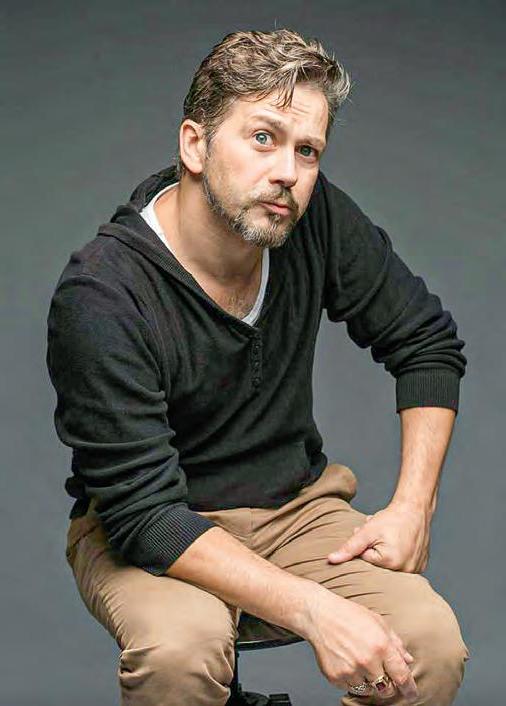
The first thing I see… Or better, I feel is snow-whiteness and cleanness, coziness, compactness, harmony… Well, it’s heaven. Oh, I want to live like this! Denis stops a flight of my fancy with a rather specific question: “What’s your shoe size?” You mustn’t dirty the floor, because the pictures will show all the dirty spots. Suddenly, my beautiful shoes are left at the entrance, and I am in a lightweight tulle skirt of weightless tulle to match props and in wide red slippers sliding round 100 square meters of clean “living room”. There is a bedroom, a kitchen, by the window there is a beautiful mirror, which I certainly want to looked in. A wedding dress is missing… No wonder, brides and grooms come here to be photographed for their wedding album almost every week. Other frequent guests are pregnant women: they want to keep in memory the most important moments of life. In general, the business -line of the studio is family. There are three halls: white, loft style and family. Even grandparents come here to “visualize” their genealogical tree.
I wonder if there were cases when clients ruined the atmosphere of home paradise, spoiled things? Because, clearly, all props cost a lot of money. But Denis doesn’t remember such cases. Sometimes, he says, a cat model runs back and forth, and it takes time to get it, for example, from under the sofa. Or a Peruvian husband does not understand what the team of photographers, led by his Belarusian wife, want from him. It can’t be helped, in Peru there is no such a thing as making a professional photo shoot… One day, Denis re ‑ calls, moms with “one year olds” came: 20 adults and 25. “There wa s also kish-mish!” — he recollects with a smile. One of the moms
wanted to breast-feed the baby and without any shyness naked her breasts. “Madonna Litta!” — Denis admired the image of Leonardo da Vinci, which as if came to life, and asked the woman to have some pictures taken while she was breastfeeding. “Well, how can we neglect such a moment? The mother is sacred!” — Denis explains.
Photographing in the studio is not a cheap entertainment. Rent ‑ al hour costs 40–45 rubles depending on the hall. On the New Year’s E ve the price may increase to 50 rubles. However, the owner of the artificial paradise has enough work for every day: someone rents the halls for two hours, someone for five, six. Both for photo shoots, and for video ones. There is a season (from October to Feb ‑ ruary), and a no -season — Denis puts me in the way of things. In the season you can make very good money. But when the number of clients decreases, there is no need to relax: it is necessary to maintain the studios (rent, utilities, etc.) permanently. And it is quite costly.
Our conversation is interrupted by UNICEF employ‑ ees, who have been shooting video in the next loft hall all this time. They need to discuss with Denis a few questions about the lighting for the next video. And they need advise on which cup looks better against the table background: glass or white. The serious faces of people discussing their questions made me think: why do we want to be photo‑ graphed? Because it’s actually all an illusion… — Th at’s right, an illusion, — D enis picks up my reasoning. — Nevertheless, people want to keep the part of their life when they are truly happy. And not in their mobile phone photos, but in the photos in which there is correct light, appropriate clothes, good atmosphere …Everything should be beautiful. Yes, photography is self -deception… Grandchildren will say: props, not real! And what’s the difference? What’s wrong if a person wants to live in il‑ lusion? People come here and the first thing they say: I want to live here! I want to spend time in an atmosphere where everything is perfect! Where you can sit in a rocking chair and forget about eve‑ rything. For example, I can’t stand two minutes in it — I fall asleep: I can smell fresh air, the curtains are barely moving, the fan is making a monotonous noise… Calmness… Why not?
All this is true, I keep thinking, but any fashion is fleeting. And the trend of spending money on someone to take you a couple of great pictures is likely to change. As wise Solomon said, all is gone, here today and gone tomorrow. Denise doesn’t agree. “I think this trend, as you say, is going to last. Why? We always want to believe in something. As it was in medieval Christianity: if you want the king‑ dom of heaven, buy it. And really: you don’t sell anything but illu‑ sions. People always want to plunge into a fictional world where they feel comfortable. Do you think this will end? I don’t think so.”
In selfie style
I rarely take pictures of myself. More often, of something or of someone. It’s kind of embarrassing to monkey in front of the black rectangle of my smartphone. Especially when others see it. But I have repeatedly heard from psychologists that well taken photos
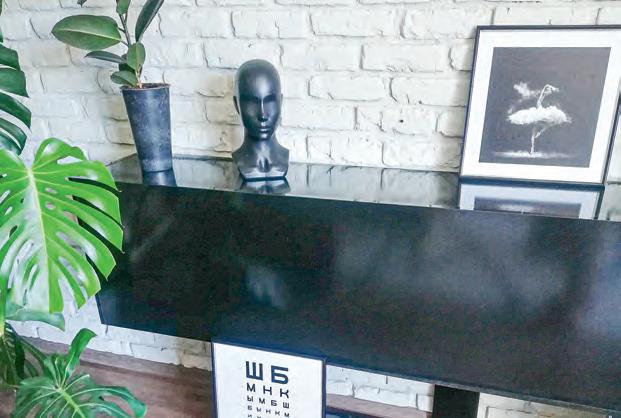
with you in the foreground increase self -esteem. And there is even pho‑ totherapy, when you find a profes‑ sional photographer, look for a suit‑ able location style and put on airs and graces in front of the camera for an hour or two… Then the best pictures are hung in the places where you can easily see them, and you keep on looking at them… Realizing how beautiful you are after all. Apparently, that’s why my friend started to post more and more Photoshop-processed photos on social networking sites. Maybe she wants to tell everyone, but above all herself: I am still young! I look great! And she is in her early fifties. There is another example. A girl has a hundred photos of the same type: her face. Here, she slightly turned her head to the right, and here — slightly bowed her head to the left. All in all, that’s the same girl. I asked: why do you need so many pictures of yourself? That’s what she said: —First of all, I don’t look in the mirror every minute of my life and I don’t see what I look like at one time or another. And in photos and videos, I can analyze myself and find flaws to correct them. Secondly, I’m constantly looking for new images of myself. I like to be different. And I want to be able to quickly express the right emotions, like professional models do. One last thing: when you go to a photo shoot, you meet new people, expand your circle of acquaintances. I like it.
Well, if something makes you happy — why not do it all your free time? The main thing, in pursuit of quality external “entourage” not to lose something really important, which is inside… After all, even the biggest colorful bubble tends to burst some day. By Alisa Gungor. Photo by the author.

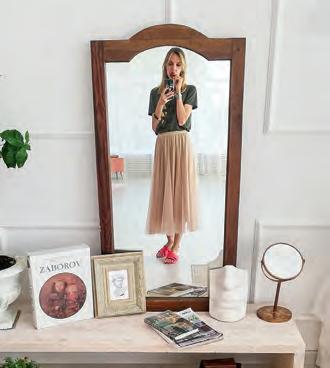
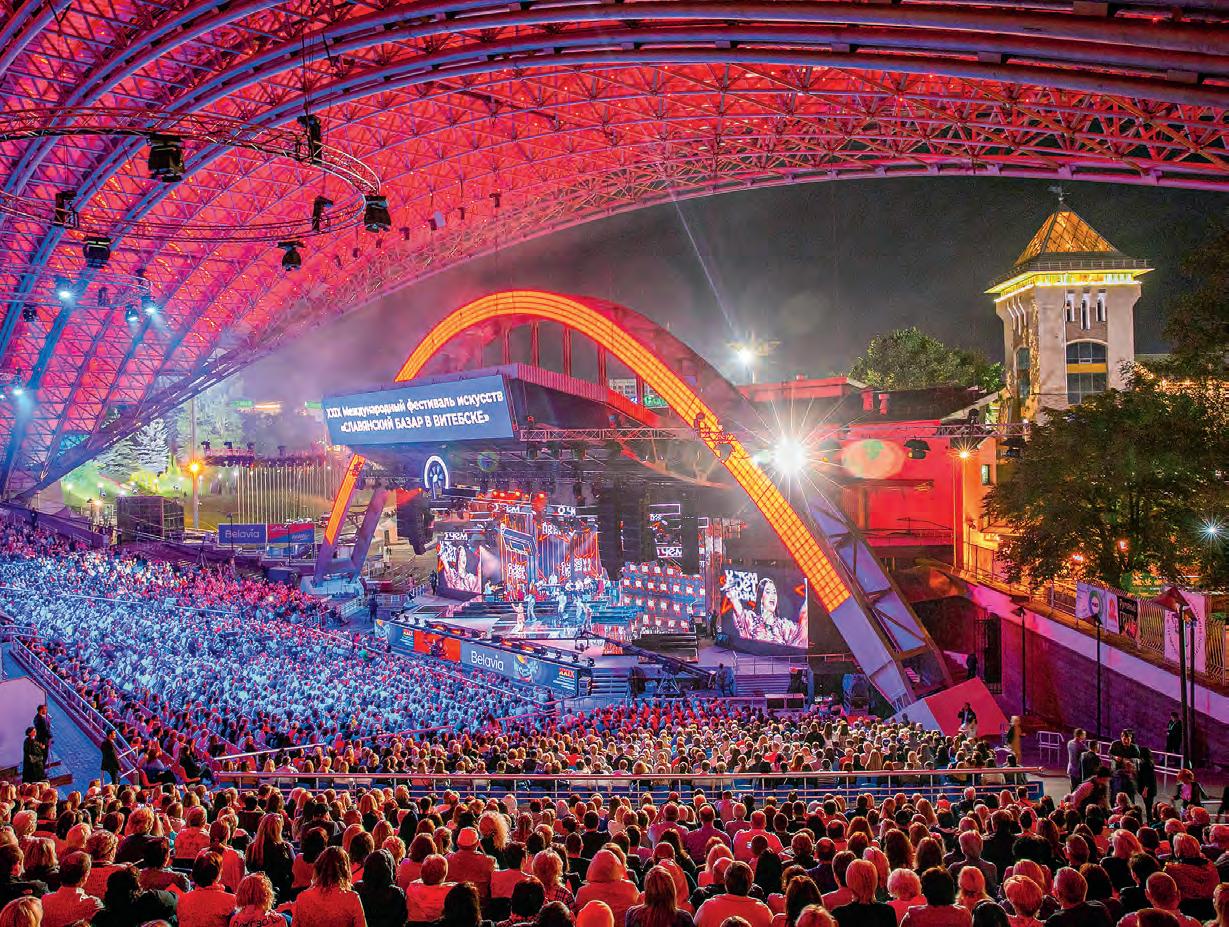
The song stays with a person…
“Slavic Bazaar” in Vitebsk, which turned 29 this year was called not only legendary, but also unique and experimental. It was the only international festive even, which was held with no postponements and cancellations caused by the coronavirus pandemic.
The organizers took all security measures, so the most popu‑ lar performers from differ‑ ent countries visited us will‑ ingly. And four days Vitebsk was imbued with the most sincere human feelings. This is what Gleb Lapitsky, Director of the International Fes‑ tival of Arts “Slavic Bazaar in Vitebsk”, said about it:
“It was an intense time, when we had to solve sometimes unsolvable problems, but we still solved them. At “Slavic Bazaar”, love and friendship found real meaning, because real friends of “Slavic Bazaar” are here today, and real art lovers are also at “Slavic Bazaar” this year”.
The opening ceremony of “Slavic Ba‑ zaar in Vitebsk” was held on July 16 at 20:30. For the first time, the concert was attended by a world -class ballet dancer, former premiere of the Royal Ballet in Lon‑ don Sergey Polunin.
Philipp Kirkorov, Alexander Buinov, Oleg Mityaev, Anatoly Yarmolenko and the ensemble “Syabry”, Inna Afanasyeva, Al‑ exander Solodukha, Vladimir Provalinsky, the Grand Prix winner of last year’s Viteb‑ sk Music Competition Adilhan Makin and many others also appeared on the stage of the Summer Amphitheatre. As for Kir‑ korov, due to the coronavirus pandemic he had not been on stage or given interviews for almost six months. Since 1994 Philipp had been shining at “Slavic Bazaar”, and finally a star was lit for him in Vitebsk, which pleased him very much.
Following the traditions, the festival was opened by President of Belarus Al‑ exander Lukashenko. By the way, these days the head of state is on a working visit to Vitebsk.
As usual, the concert was held at the Summer Amphitheatre. By the way, the Summer Amphitheatre in Vitebsk is not only a brand identity of the city. This is one of the recognizable architectural sym‑ bols of Belarus. This year the main stage of the International Festival “Slavic Ba‑ zaar in Vitebsk” turned 32 years old, and 19 of them it has been open-air. The con‑ struction of an openwork protective cover began in 2006 by order of Alexander Lu‑ kashenko. In terms of technical solutions. the design, technological solution, installation, testing of the structure — all stages of the construction and the facil‑ ity itself have become unique not only in our country but also in the world. Over 29 years the Vitebsk Cultural Forum has become a real festive event for spectators, and for its organizers — an opportunity to discover new vocal talents. As for par‑ ticipants of children’s and adult contests of young performers, they got their first chance for popularity. Before the open‑ ing concert, last year’s winners — Adilhan Makin from Kazakhstan and Ksyusha Ga‑ letskaya from Belarus — hoisted the flag of “Slavic Bazaar” up the festival flagpole.
The long -awaited words were also heard: “Attention! Says and shows Viteb‑ sk!” They, as well as the President’s words that “Slavic Bazaar has become the heart of cultural and spiritual unity”, were received with enthusiasm. —And this heart should be beating in the name of the main idea which is the ba‑ sis of the festival: “Through art — to peace a nd mutual understanding”. Especially today, when all countries and peoples are on the verge of global geopolitical crisis, it is vital for us to preserve the tradition that unites people. After all, no matter what hap ‑ pens in the world, the international festi‑ val in Vitebsk has always destroyed barriers a nd strengthened friendship between peo‑ ples. In his speech, the President stressed: — At this t I am overwhelmed with feelings of joy and pride for all of us, first of all for Belarusians who have never been and never are on their knees before the challenges of time. An example of this is “Slavic Bazaar”, a festival with a bright and interesting fate. As you remember, its history began in the 90s against the back‑ ground of the uneasy formation of new relations between sovereign states created out of the splinters of the huge empire.
Alexander Lukashenko reminded that the festival was intended to be a festival of friendship between brotherly peoples — Belarusians, Russians, Ukrainians, repre‑ sentatives of other states: — A quarter of a century ago this great event managed to tour through the cities and villages of the immense Soviet Union,
Alexander Lukashenko Peace, friendship and mutual understanding have always reigned at the Vitebsk festival. What is the secret? Probably, and first of all, in the cultural code of Slavs, in the general thousand-year history of ancestors of modern Slavic peoples. It will not give us the facts of barbaric destruction of traditions and other civilizations. There is only the creation and mutual enrichment of cultures.
the collapsed Soviet Union. This year it could have made a pause, as the world fa‑ mous shows and competitions did.
And the President made a special em‑ phasis: — But then and today we have pre‑ served our “Slavic Bazaar”, our Slavic tra‑ dition.
The head of state stressed that de‑ spite international conflicts, intereth‑ nic and domestic political crises, peace, friendship and mutual understanding have always prevailed at the Vitebsk festival: — W hat is the secret? Probably, and first of all — in the cultural code of the Slavs, in the common thousand-year his‑ tory of the ancestors of modern Slavic peoples. It will not give us the facts of bar‑ baric destruction of traditions and other civilizations. There is only creation and mutual enrichment of cultures. Therefore, said the Head of State, every year “Slavic Bazaar in Vitebsk” attracts participants and guests from around the world to the picturesque banks of the Dvina: — T o the city that has been inspiring famous musicians, artists and actors for centuries. It has given us talented film di‑ rectors and designers, scientists, athletes and coaches who have made Belarusian and not only Belarusian land famous all over the world.
And today, he said, the brightest per‑ formers, the kindest and most responsive spectators have gathered in this amphi‑ theater: — There would have been no “Slavic Bazaar” without them. The ones who come to this festival answering the call of their hearts. Those who are united by a sincere love for the national Slavic culture. Let the festival days give you a lot of bright emotions, the contests will open up new names in the world of art.
Over the years, the festival acquired a lot of good traditions. Among them, a spe‑ cial prize of the Prsident “Through art — to peace and mutual understanding”. This year it went to Moscow with an old friend of “ Slavic Bazaar”, People’s Artist of Russia Philipp Kirkorov.
Alexander Lukashenko addressed the Russian performer: — Philipp, of course, is a brilliant ac‑ tor, performer, singer. Today I asked cer‑ tain services (we have them) to give me his detailed biography. And I was amazed that this man has a huge number (we can say, since childhood) of various international awards. And I thought: Well, we will him another award. And then I thought: no, not another one. This is an international award, this is a soulful Slavic award. And its roots are Slavic. And I think he will receive it as the highest award.
It is hard to find such a sincere person, the head of state stressed: —Everything he says, comes from the bottom of his heart, despite the fact that he is an artist, a great artist. For his part, Philipp Kirkorov said he was honored to receive this award from Alexander Lu‑ kashenko:

— Today, at this difficult time, when “Slavic Bazaar” is the only one that survived among all musical events in the former So‑ viet Union, I consider this prize very sym‑ bolic. The fact that today you have found an opportunity to hold this festival, even “Eurovision” gave in, was postponed, while Belarus and “Slavic Bazaar” lived, are living and will be living! I am proud of my friend‑ ship with you, Belarus!
The Russian singer joked that he still had something to strive for in Belarus. Af‑ ter all, he already had the title of People’s Artist of Russia, Ukraine and Moldova, but had no Belarusian title of this level.
Another award, the Union State Prize in Literature and Art, was handed to the ar‑ tistic director of the Cinema Actor’s Thea‑ tre Studio Alexander Efremov, famous d ocumentary filmmaker Anatoly Alay and a creative team of directors Irina Margo‑ lina, Oksana Cherkasova, Elena Petkevich a nd Irina Kodyukova. For example, Alexan‑ der Efremov was nominated for the Union S tate Prize not only for a series of theatrical productions of Russian classics in the actor’s theatre-studio, but also for films dedicated to the Great Patriotic War. As the director himself confessed, his father defended Bela ‑ rus, was wounded here… And it influenced h is turn to the theme of the war.
The winners of the Grand Prix of the festival are Belarusians Roman Voloznev and Angelina Lomako

The gala concert of the opening cer‑ emony lasted until late at night. Only fa‑ vorite and people’s artists came on stage. Th e renowned stars came to support the rising ones. The smile of Alexander So‑ lodukha, Chairman of the Jury of the C hildren’s Competition, was shining from the stage. Igor Butman’s saxophone sounded. Anatoly Yarmolenko did not miss the opportunity to say a few warm words to the audience. People sang along with Alexander Buynov, Inna Afanasyeva, Elena Vaenga and, of course, Philipp Kir ‑ korov. He knows the audience and the s tage of the Summer Amphitheatre well. More than once he collected full houses there, used to be a jury member. And since this year, the king of the Russian stage has an excuse to visit Vitebsk more often. Before the concert of the open ‑ ing ceremony, the name “cornflower” of P hilipp Kirkorov appeared in the Festival Square of Stars. By the way, Alla Pugache‑ va, ex -wife of Kirkorov, was more than ten years ahead of the artist: her flower ap‑ peared in the square back in 2009. At the o pening ceremony of her own star Phillip made a joke: —At last, Alla Borisovna and I are back together again! And seriously, it’s madly nice to be back here in my beloved Vitebsk.
Russian President Vladimir Putin, by the way, sent a greeting to the guests and participants of the festival, in which he noted: — For many years now the festival has been serving the noble goals of spiritual unity and mutual enrichment of the cul‑ tures of the brotherly Slavic peoples, play‑ ing a significant role in the development of multipolar, multilateral humanitarian cooperation.
Who and what sounded in Vitebsk?
Melodic Balkan ethnics, a singsong Ukrainian “language (mova)”, Brazilian drums and favorite Russian hits — Vitebsk has long connected not only neighboring countries but even continents. After all, music, according to the director of the festival Gleb Lapitsky, is also the best lan‑ guage of folk diplomacy:
It seems to me that we are returning to the festival its right tradition: to hold Days of Slavic cultures. Of course, we can do it in different formats, but we must de‑ clare the triunity of Belarus, Russia and Ukraine. If people of art fail to do it, no politicians can do it. When it became clear that the festival program should be revised, we had a desire to make a full concert of Ukrainian performers. First of all, this was what the audience wanted. Secondly, it
turned out that Ukrainian artists respond‑ ed to our proposal with great pleasure. And everything turned out to be fine. This year “Slavic Bazaar” brilliantly hosted not only the concert of the Union State, but also grand concerts of Belarusian and Ukrain‑ ian artists.
Vitebsk spectators — and it was seen! — had really missed their favorite artists: the concert “With Ukraine in the Heart!” predictably gathered a full house. The guests and participants of “ Slavic Bazaar in Vitebsk” were greeted by the President of Ukraine Vladimir Zelensky. “The hospitable Belarusian land welcomes Ukrainian masters and their admirers, who together create good mood, true friendship and eternal values. There are no boundaries in art. Its goal is to inspire and fill with happiness,” the message said.
The first prize of the Young Perform‑ ers Competition was awarded to Ukrain‑ ian Elina Ivashchenko. The winner of t he second prize was Carolina Lyndo from Lithuania, while the third prize was shared by Ivona Odicki from Bosnia and Herzegovina and Hansultan from Ka ‑ zakhstan.
For Ukrainian pop diva Taisia Povaliy, the stage of the Summer Amphitheatre brought luck many years ago. The singer has entered the history of the festival not only as the first winner of the Grand Prix of the contest of young performers, but also as last year’s owner of the named “corn‑ flower” in the Square of Stars. The People’s Artist of Ukraine joked: —As you see, I am getting younger, and the festival is getting stronger. I am happy to be in my beloved Belarus again. I call it not only my beloved, but also my dear one, because it was “Slavic Bazaar” that gave a boost to my career, within just one day I became famous. That is why Belarus is my creative motherland. I do not get tired of thanking it. My heart will stay here forever.
People’s Artist of Ukraine Tina Karol also found a lot of warm words for our country and its residents: — Belarusians and Ukrainians — we are soul mates. It can be felt especially now, at this difficult time, when fate has given us a chance to be close, to be together. I want to thank “Slavic Bazaar” for uniting the Slavs. It’s nice that the Belarusians, despite the pandemic, have preserved the long tra‑ dition of the festival and have not put it on hold. “Slavic Bazaar” is a real festival of the soul. Tenderness, coziness, hospitality live here — everything is like at Mom’s house.
Starry Belarusian-Ukrainian duets proved once again that Vitsebsk is called the capital of Slavic diplomacy for a rea‑ son. The joint work of Tina Karol and Inna Afanasyeva was a surprise for many view‑ ers. For the Ukrainian, the composition
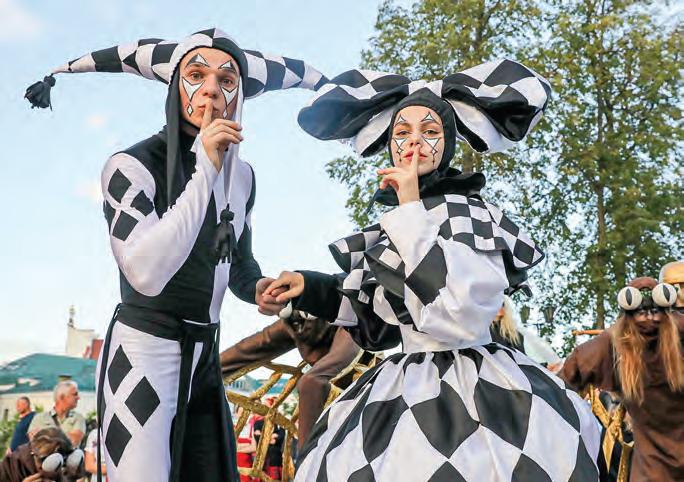
Street Art Festival "On Seven Winds" was held at "Slavic Bazaar in Vitebsk" “Native banks” was a kind of creative ex‑ periment. That was the first time the singer sang a song in the Belarusian language. Two more unexpected performances: duet of our Alena Lanskaya and People’s Artist of Ukraine Pavel Zibrov (they performed the well -known “Chervona ruta”). The audience was also delighted by Anatoly Yarmolenko and the men’s vocal quartet Hetman, who performed “Let’s Survive”, a composition from the repertoire of the ensemble “Syabry”, in 5 voices.
From year to year hundreds of artists from different countries come to Belarus to turn the city on the Dvina into the mu‑ sical capital of the whole Slavic world, to meet the audience and, of course, to ad‑ mire Vitebsk at night.
Elena Vaenga, another long-awaited guest and longtime friend of the festival, spoke about such important things as brotherly love of the Slavs and a special festival spirit: — “ Slavic Bazaar” is a diamond among festivals. I don’t know how you manage to do it, but the most heartfelt and kindest spectators are here.
The Grand Prix of the International Children’s Music Competition “Viteb‑ sk‑2020” for the second year in a row was awarded to a representative of our country, i. e . 14‑year - old Angelina Lomako won Be‑ larus its fifth victory.
Roman Voloznev returned to Minsk with a diploma as Grand Prix winner of the Vitebsk festival. At the gala closing con‑ cert of the festival, 14 young performers told their musical stories. But our Roman, as it turned out, was the best “storyteller”. Voloznev received at the festival in Vitebsk the cherished “Lyra” and the money prize of 20 000 US dollars: — I can’t realize it all yet. Vitebsk, just thank you! Of course, I expected only vic‑ tory from the contest, and when it hap‑ pened, I still could not believe it.
The festival ended up with colorful fireworks. Thousands of lights were shin‑ ing in the night sky of Vitebsk. And next year “Slavic Bazaar” will celebrate its 30th anniversary. By Mikhalina Cherkashina. Using “BelTA” materials, “SB. Belarus segodnya”.







